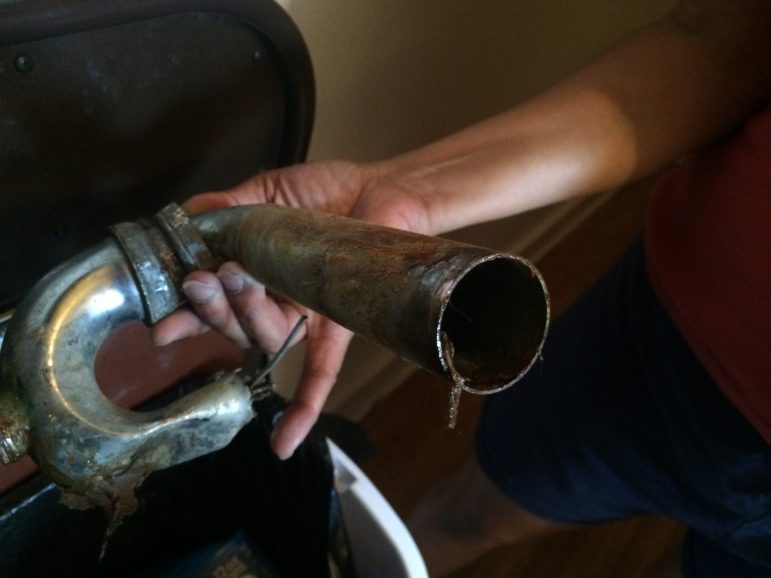
Deborah Cruz
While she waited for her landlord to fix this pipe, Ketty Marcucci had to brush her teeth over the bathtub.
From November 2015 until April 2016 the residents of the interconnected buildings on Merriam Ave lived with no gas; they say they were stuck living through the holidays cooking off of electrical hot plates. This was not an isolated problem, tenants say, contending that they have had to deal with vermin infestation, leaks, filthy hallways and a lack of heat or hot water. After frequent complaints to landlord David Diamond led to few changes, a group tenants filed a lawsuit last week.
A dispute between tenants and a landlord over building conditions is nothing new. What is interesting about the Merriam Avenue case is that the complaint has been filed in Supreme Court rather than at the more traditional venue of housing court.
The tenants are represented by Bronx Legal Services and the Legal Aid Society, with support from New Settlement Apartments’ Community Action for Safe Apartments. Tenants are seeking compensation for damages, something they could not get if they chose to go to Housing Court.
Jennifer Smith, staff attorney at Bronx Legal Services, initially became involved after the gas shutoff. “We are trying this out because you could bring it to housing court, but we found that things aren’t happening with [housing court] cases. They just seem to drag on for a very long time and it’s easy to delay,” says Smith , “We want to get these people money damages in the form of rent abatement, but in Housing Court, that is a claim they cannot bring.”
A total of 27 tenants of 1307,1311, and 1315 Merriam Avenue are suing Diamond, of Diamond Property Group Inc.. They allege that when stuck in the middle of winter without heat, hot water or cooking gas, they were forced to improvise buying heaters and using the electric plates that were provided for them. This led to higher electricity charges for many tenants that Diamond refused to cover, the tenants allege. The lawsuit being filed against him in Supreme Court will seek compensation for all of what the tenants have lost due to the gas outage, although a dollar figure has yet to be set.
Tenants paint a grim picture of life in the building. “The heat is never on, even in the winter, they turn it on for 10 minutes in the morning and then the rest of the day and night all cold. The nights were freezing,” says Patricia Linen, a resident of 1307 Merriam Avenue for 36 years. While the gas was cut off for six months, heat has always been an issue in the building, she says.
“Two weeks after they gave me the pair of electric hot plates, they burned out. I asked for another one and they gave me a single hot plate, that was useless too,” says Linen, who contends making food was almost impossible. “It would take hours to make a single plate of breakfast.”
Ketty Marcucci, another tenant included in the Supreme Court lawsuit, says she asked management for months to fix her bathroom sink. “I had to brush my teeth over the bathtub during all that time.” Reaching into the garbage and pulling out a rotted bathroom drainpipe, Marcucci says the problem had just been repaired.
A few months ago the superintendent was replaced after many complaints that the previous super was not doing enough. The hallways have been cleaned and repairs have been done to the apartment. “David started sending out for repairs only after he realized he was being sued. Before that no attention was paid to us,” Marcucci, who moved in two years ago, says. She says other conditions in her apartment have not changed, pointing at many leaks in her ceiling including paint bubbles full of water, and at her tile floors which had extensive water damage.
Tenant advocates have long complained about Housing Court, where most renters have no legal help as they contest cases against landlords. What’s more, according to Jenny Laurie, Executive Director of Housing Court Answers, taking a landlord to Housing Court lands you on a the “tenant blacklist”, “Landlords screen new tenants to see if they are on the ‘tenant blacklist’ and if they are, most of the time, they turn them away.” Essentially becoming a tool landlords use to weed out the “troublemakers.” (Landlords have complaints about Housing Court, too.)
It’s unclear, however, whether the Supreme Court route being explored by the Merriam Avenue tenants is a viable alternative. “I wouldn’t call taking this case to the Supreme Court an alternative route because we still don’t know what is going to happen,” Smith says.
There are no dates yet set for the preliminary conference in the case. Diamond did not reply to requests for comment.
City Limits of housing policy is supported by the Charles H. Revson Foundation and the New York Community Trust.








